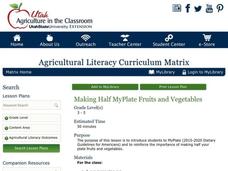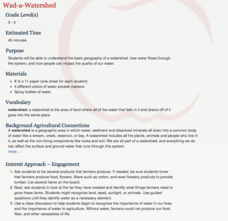Chesterfield Township Elementary School
Gifted and Talented Enrichment Curriculum
Looking to start or support a Gifted and Talented program? An 80-page packet outlines grade-leveled lessons in all subject areas as school district's Gifted and Talented enrichment curriculum.
Jamestown-Yorktown Foundation
What Was Everyday Life like in Colonial Virginia?
What was everyday life like in Colonial Virginia? To find the answer cooperative groups work collaboratively to read an informational handout and complete a graphic organizer. The speaker of the group then shares their new-found...
Jamestown-Yorktown Foundation
What Was Everyday Life like in Colonial Virginia?
After reflecting on jobs people perform in the present day, scholars discuss what they believe jobs would have been like in Colonial Virginia during the American Revolution. Small groups then perform a jigsaw using informational packets....
Arbor Day Foundation
Trees: A Joy Forever
This Arbor Day, put on a show! A three-scene play follows a boy and girl that run into Arbor Day founder, J. Sterling Morton. Morton describes how the holiday came to be and discovers how his hard work has grown into a national...
Serendip
Food, the Carbon Cycle and Global Warming
As the world population increases, demands on the carbon cycle also increase. A well-designed lesson first explores the greenhouse effect and its impact on global warming. Further sections have pupils study the effect of greenhouse gases...
California Academy of Science
Sustainable Food Solutions: Weighing the Pros and Cons
A growing demand for sustainable food systems comes from schools and even some cities. So what are some solutions? Scholars consider four different ways to approach sustainable food solutions and list the pros and cons of each. The fifth...
California Academy of Science
Exploring the Impacts of Feeding the World
Approximately 50 percent of people in the world who are chronically hungry work in agriculture. While it seems counter-intuitive, the farther you live from a farm, the more food options are available. Scholars explore concepts related to...
California Academy of Science
Food for Thought: Defining a Problem to Find a Solution
Scholars approach a problem trying to plan a meal for a class party. They learn about the restrictions and must decide what information they need to plan the meal. The first lesson in a 13-part unit on Our Hungry Planet encourages...
California Academy of Science
Our Hungry Planet: Design Thinking Challenge
Scholars investigate an issue associated with food systems and design their own solutions. Working collaboratively, they follow each step in the design process to complete the 10th lesson of the 13-part Our Hungry Planet series.
California Academy of Science
Rapid Brainstorming: How Can We Improve Our Global Food System?
In 2018, the average fast food burger cost $2.64 while a salad averaged $4.14. Does the price difference matter to public health? Scholars consider that question and others in a brainstorming session about improving our global food...
Agriculture in the Classroom
Build it Better
If you think you can do better, feel free to give it a try. Pupils learn about the work on Temple Grandin and consider ways to improve animal handling facilities. They work in groups to build models to showcase their ideas.
Agriculture in the Classroom
Making Half MyPlate Fruits and Vegetables
Establish healthy eating habits with a lesson focused around MyPlate's food recommendations and the importance of eating fruits and vegetables. Through class discussion and worksheet completion, scholars discuss the best choices of foods...
DiscoverE
A Clever Way to Water
Your plants will survive without you. Scholars create a device that can water plants using a coiled string. Along the way, they learn about adhesion and cohesion of water. The challenge is to keep the plants alive for at least a week.
DiscoverE
Clean It Up
Water, water, everywhere, but not a drop to drink—until we clean it, of course! Scholars design a filtration device that removes pollutants from water. The goal is to have the water come out as clean as possible from the device. How...
Agriculture in the Classroom
"Steer" Toward STEM: Careers in Animal Agriculture
Think like an engineer and an agricultural scientist over the course of 12 lessons in a STEM based unit. Young scientists take on the roles of animal physiologists, animal geneticists, agricultural engineers, animal nutritionists, and...
Pennsylvania State University
Learn, Protect, and Promote Water
A hands-on activity helps learners explore the water cycle. After discussing how they use water, classes discuss water pollution and then move into a simulation where 20 pupils move through the water cycle based on description cards.
Agriculture in the Classroom
Wad-a-Watershed
What kind of impact do humans have on watersheds? Find out in a lesson that defines, explores, and promotes ways to protect our watersheds. The ultimate goal of the lesson is for learners to discover how a watershed is impacted by...
Agriculture in the Classroom
A Rafter of Turkeys
How did that turkey get from the early Aztec culture to your table? Learn about the history of wild and domesticated turkeys in North America, as well as their inclusion in Thanksgiving traditions, with a two-part agricultural science...
Alabama Department of Archives and History
Alabama Farm Life in the Great Depression
The Great Depression not only impacted city folk and factory workers, it also had a profound effect on farmers. Young historians examine primary source materials that document the struggles of Alabama farmers during this time and then...
American Farm Bureau Foundation for Agriculture
My Miniature Greenhouse!
Here is an activity that will peak your super scientists' interest and knowledge of greenhouse gardening. Green thumbs flourish when they build, prepare, take care of, and observe their seedlings inside a miniature greenhouse. With...
American Farm Bureau Foundation for Agriculture
Welcome to My American Farm!
Take a step into the virtual farm world and explore the impact farming has on our everyday eating habits. Future farmers discover the meaning of agriculture and the hard work that goes into providing food for us to enjoy. A computer game...
Have Fun Teaching
Scientific Method
Encourage your students' inner scientist by conducting experiments and recording their findings. This printable incorporates every part of the scientific method into an easy-to-read outline of experimental questions, research,...
National Museum of the American Indian
The A:Shiwi (Zuni) People: A Study in Environment, Adaptation, and Agricultural Practices
Discover the connection of native peoples to their natural world, including cultural and agricultural practices, by studying the Zuni people of the American Southwest. This lesson includes examining a poster's photographs, reading...
Food Project
Trace The French Fry
How does locally grown produce sold at a farmer's market compare to a more complex industrial system in the way they each affect the environment, people, and the economy? Pupils explore the different types of food systems and how they...

























